I have always loved the Pacific Northwest, so I was excited to have the opportunity to sail aboard Cunard Lines ship Queen Elizabeth as a guest lecturer last month. Our journey weaved through the fjords of the Inside Passage that rise from the sea like something forgotten by time. The mountains stand tall and sharp, their faces cut from ancient stone, black and gray beneath a sky that hangs low and heavy with mist. The water runs deep, winding between the cliffs that drop straight into the sea where cedars and firs cling to the steep slopes, roots grasping at the rock as if trying to hold on against the pull of gravity and time.
It is a place that feels eternal yet fragile. The mountains look like they've always been there, and maybe they have, but even they wear down over time. The glaciers that once carved these fjords are shrinking now, retreating into themselves, leaving the mountains bare. And you can't help but feel that the land is changing in ways it wasn't meant to, that this wild and ancient place is slipping away, piece by piece.
The glaciers of Alaska are disappearing, not in fits and starts but in slow, deliberate agony. You can stand on the rocks where they used to flow, feel the cold air rising from the remaining ice, and know that something old and eternal is being lost. The rivers that once carried the ancient ice are thinner now, retreating into themselves like a wounded animal. The ice melts into water, and the water runs into the sea, but it's not the kind of change that makes a sound. It's quiet. Too quiet. Like the dying breath of something bigger than any of us.
When I first visited a glacier in my youth, it seemed like something that would last forever—a towering white giant that stretched out as far as I could see. But they're retreating now, like soldiers falling back in a losing war. Every year, they pull further away from where they once stood, and I wonder how much time they've got left.
We must recognize what it means. The earth is warming, and the signs are everywhere. Some say it's natural, part of a cycle. But if you've seen the changes like I have, you know it's more than that. The world is shifting under our feet, the balance of things tipping. The glaciers are just one part of it, a symbol of something bigger that's unravelling.
The loss of the glaciers is not just Alaska's story. It's the story of a planet changing in ways we may not be ready for: a world heating up, seas rising, storms growing fiercer. I stand on the ship's deck, watching the ice, and I feel the weight of it all pressing down. The question lingers in my mind: What are we leaving behind for the ones who come after us?
I feel a deep sense of loss. But not just for the glacier. For everything. For the land, the air, the sea. For all that's slipping away in the quiet places, most people never see. I've spent my life in these wild spaces; witnessing them unravel is seeing a part of myself crumble. There's a weight to it, a heaviness that settles deep in your chest. And I know I can't change the course of a world hell-bent on devouring itself, not by my hand alone, but I can be a voice in the storm.
Not a voice of anger. Not a voice of despair, either. What we need is truth. Straightforward and without pretense. To stand and say what's happening, to lay it bare for all to see, even if people would rather look the other way. Because maybe, just maybe, if enough of us speak up, if enough of us point to the cracks forming in the ice and the sky and the earth, we can make a difference. Not by shouting over the chaos but by speaking with a clarity that can't be ignored.
We released this audio podcast to our paid subscribers earlier this week. We wanted to share it with everyone today.
Apa Sherpa was born in poverty and rose to become the greatest climber in the history of Mount Everest. Apa struggled greatly to obtain a modest education in his youth and worked diligently to provide for his family amidst difficult economic circumstances. Today, he endeavors to provide the opportunities he never had to the next generation, starting from his home village in Nepal.
Apa Sherpa, the man who summited Everest 21 times has created an educational foundation for the children of Nepal.
On our recent Queen Elizabeth cruise to Alaska, Apa Sherpa, along with Jill Heinerth, was one of the guest lecturers in the ship’s theater. We were very moved by the man and his mission.
What I’m Reading - from Robert
With this book, Peter M. Hunt, a former Naval Aviator (that’s the preferred term for US Navy pilots) takes readers on a fantastic odyssey, as he searches the sea floor for a crashed aircraft off the coast of Washington state. One of the hooks of the story is that Hunt is an accomplished technical scuba diver with a lot of wreck diving experience, including multiple trips down to the Andria Doria - and he once flew the very aircraft he seeks. Adding to the intensity of the tale, Mr. Hunt is wrestling with managing his newly diagnosed Parkinson’s disease.
Jill first met the impressive Mr. Hunt at a diving conference where they shared a book selling table. She encouraged me to read The Lost Intruder for inspiration as I am currently writing a fictional book with characters that are Navy divers.
As a US Navy photographer I once documented a minor accident involving an A-6 Intruder on the runway at Naval Station, Sigonella, Sicily, and have always admired the design and mission of these quirky, yet deadly combat aircraft.
This book is not just for aviation buffs and scuba divers. It is a testament to dedication, tenacity, and the human spirit. Get it on Amazon here.


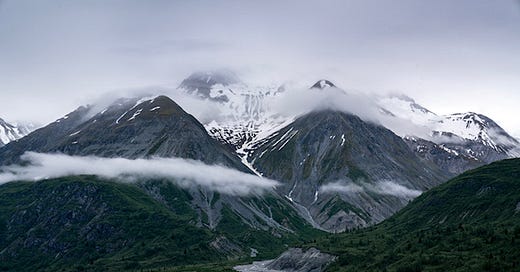


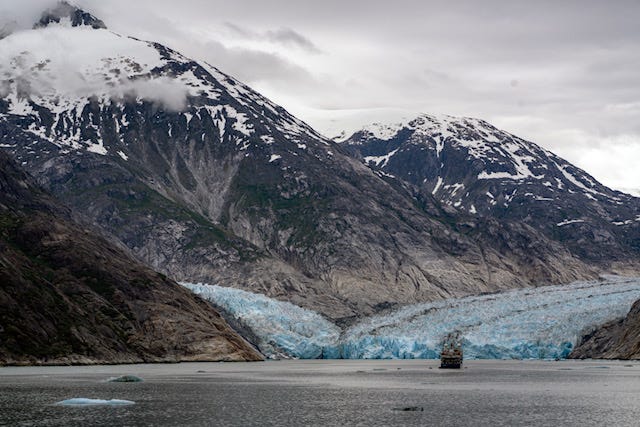
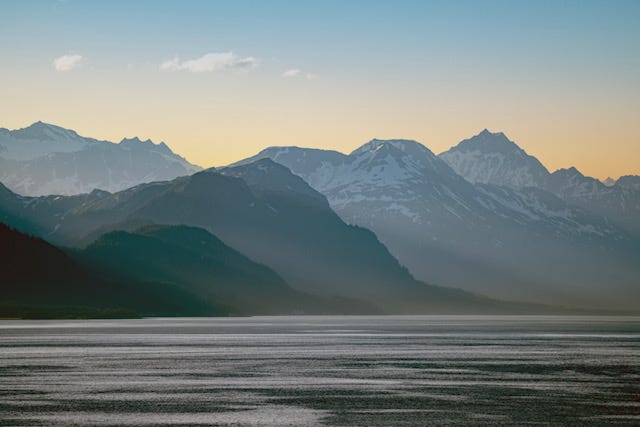
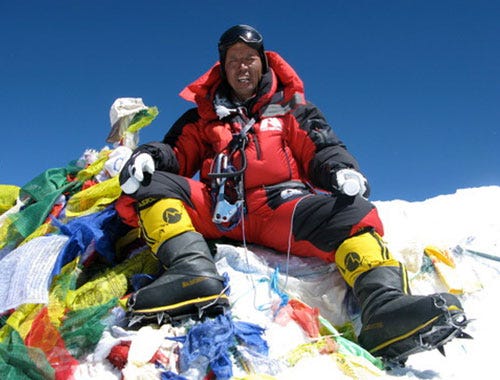
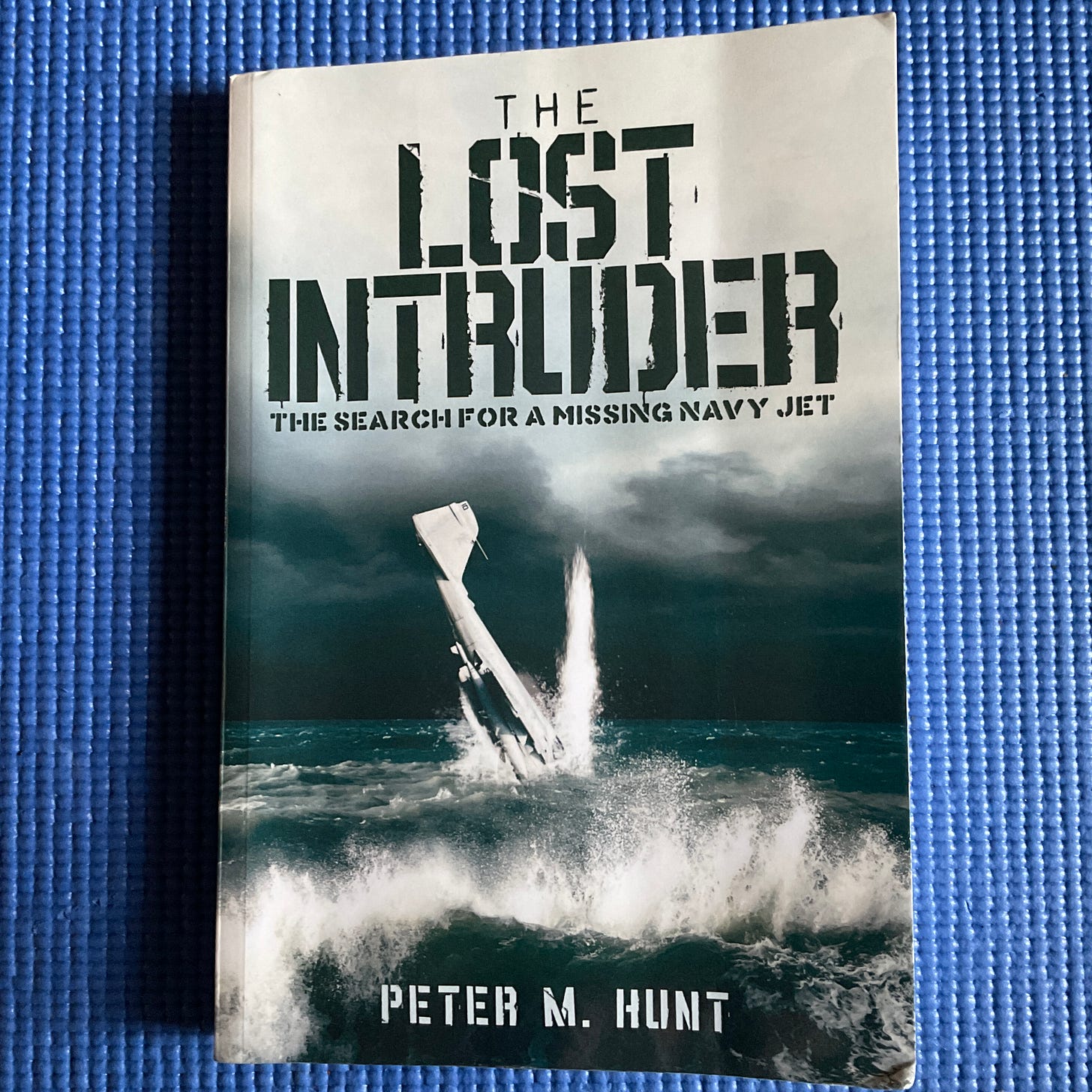
Thank you both for sharing your thoughts about your journey, and the story of Apa Sherpa. Thank you for also sharing what you are reading.
Reading your article made me feel so sad, because of what you are saying I also witnessed in my life and in my travels! It’s heartbreaking and I try to not feel despair, look for any glimmer of hope, new innovation, changing in attitudes! When I care for my babies at work, I always try to imagine the kind of earth they are inheriting…